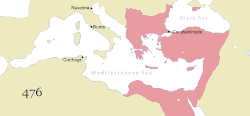
Back Kaiserreich Nikaia ALS إمبراطورية نيقية Arabic امبراطورية نيقيا ARZ Imperiu de Nicea AST Nikeya imperiyası Azerbaijani نیکیا ایمپیراتورلوغو AZB Никея империяһы Bashkir Нікейская імперыя Byelorussian Нікейская імпэрыя BE-X-OLD Никейска империя Bulgarian
Empire of Nicaea | |||||||||||
|---|---|---|---|---|---|---|---|---|---|---|---|
| 1204–1261 | |||||||||||
 The Empire of Nicaea in 1204, shortly after the Fourth Crusade | |||||||||||
| Status | Rump state of the Byzantine Empire | ||||||||||
| Capital | Nicaea (İznik) (de jure) Nymphaion (Kemalpaşa) (de facto) | ||||||||||
| Common languages | Byzantine Greek | ||||||||||
| Religion | Greek Orthodoxy (official)[2] | ||||||||||
| Demonym(s) | Roman later Hellene[3] | ||||||||||
| Government | Monarchy | ||||||||||
| Emperor | |||||||||||
• 1204–1222 | Theodore I Laskaris | ||||||||||
• 1222–1254 | John III Doukas Vatatzes | ||||||||||
• 1254–1258 | Theodore II Laskaris | ||||||||||
• 1258–1261 | John IV Laskaris | ||||||||||
• 1259–1261 | Michael VIII Palaiologos | ||||||||||
| Historical era | High Middle Ages | ||||||||||
• Established | 1204 | ||||||||||
• Disestablished | July 1261 | ||||||||||
| |||||||||||
| History of the Byzantine Empire |
|---|
 |
| Preceding |
| Early period (330–717) |
| Middle period (717–1204) |
| Late period (1204–1453) |
| Timeline |
| By topic |
|
|
The Empire of Nicaea (Greek: Βασιλεία Ῥωμαίων) or the Nicene Empire[4] was the largest of the three Byzantine Greek[5][6] rump states founded by the aristocracy of the Byzantine Empire that fled when Constantinople was occupied by Western European and Venetian armed forces during the Fourth Crusade, a military event known as the Sack of Constantinople. Like the other Byzantine rump states that formed due to the 1204 fracturing of the empire, such as the Empire of Trebizond and the Despotate of Epirus, it was a continuation of the eastern half of the Roman Empire that survived well into the Middle Ages. A fourth state, known in historiography as the Latin Empire, was established by an army of Crusaders and the Republic of Venice after the capture of Constantinople and the surrounding environs.
Founded by the Laskaris family,[6] it lasted from 1204 to 1261, when the Nicenes restored the Byzantine Empire after they recaptured Constantinople. Thus, the Nicene Empire is seen as a direct continuation of the Byzantine Empire, as it fully assumed the traditional titles and government of the Byzantines in 1205.
The Despotate of Epirus contested the claim in 1224 and became the Empire of Thessalonica, but was forced to renounce its claim by the Nicenes in 1242. The Empire of Trebizond, which declared its independence a few weeks before the Sack of Constantinople in 1204, withdrew all claims to being a continuation of the Byzantine Empire in the Treaty of 1282.
- ^ Stavridou-Zafraka, Alkmeni (2015). "Byzantine Culture in Late Mediaeval Greek States". Βυζαντιακά. 32: 211.
- ^ Melton, J. Gordon (2014). Faiths Across Time: 5,000 Years of Religious History [4 Volumes]: 5,000 Years of Religious History. ABC-CLIO. p. 800. ISBN 978-1-61069-026-3.
- ^ Maltezou, Chryssa; Schreine, Peter (2002). Bisanzio, Venezia e il mondo franco-greco (in French). Istituto ellenico di studi bizantini e postbizantini di Venezia. p. 33. ISBN 978-960-7743-22-0.
Theodoros Laskaris totally avoids the terms Latinoi in his letters and uses Italoi instead, he also replaces the terms Romaioi (Romans) and Greek by Hellenes.
- ^ Vasiliev, Alexander A. (1952). History of the Byzantine Empire, 324–1453. Univ of Wisconsin Press. p. 546. ISBN 978-0-299-80926-3.
- ^ The Columbia history of the world by John Arthur Garraty, Peter Gay (1972), p. 454: "The Greek empire in exile at Nicaea proved too strong to be driven out of Asia Minor, and in Epirus another Greek dynasty defied the intruders".
- ^ a b A Short history of Greece from early times to 1964 by W. A. Heurtley, H. C. Darby, C. W. Crawley, C. M. Woodhouse (1967), p. 55: "There in the prosperous city of Nicaea, Theodoros Laskaris, the son in law of a former Byzantine Emperor, establish a court that soon become the Small but reviving Greek empire."